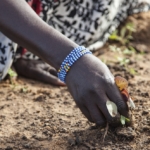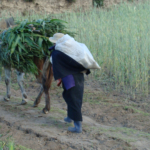


Association Malienne d'Eveil au Developpement Durable
Mali and Burkina Faso
2/2019—2/2023
In West Africa, rapid human population growth puts intense pressure on the smallholder agricultural production systems to meet both the nutritional and economic needs of the society. The surge in cash crops, combined with the strong demand for food, has led to a major expansion of cultivated areas, at the cost of production capacity. Agricultural extension has generally operated at the expense of the ecological balance of the environments, since it often results in the destruction of natural plant formations. Such a trend is not sustainable. To overcome this problem, several researchers and organizations strongly recommend the use of agroecological intensification, by moving towards production systems that maximize performance while preserving biodiversity. The approach is based on the use of ecological processes, the adoption of improved variety seeds adapted to environmental conditions and the implementation of sustainable production systems. Breeding programs were introduced in sub-Saharan Africa for two decades. However, without effective involvement of farmers in the various phases (from research to the marketing of grain), successes remain limited. Farmers hold valuable traditional knowledge in ecology and agricultural production systems in their respective communities. This is why the first phase of the “Farmer Knowledge” project aimed to maximize this know-how in a research framework to promote the use of cereal-legume associations, while developing a networking capacity and more knowledge sharing. The proposed approach was based on the assumption that research should be led by the farmers themselves to adequately meet their real needs. The conclusive results demonstrated the effectiveness of the sorghum-cowpea and millet-cowpea combinations in a configuration of two cereal/two legume lines or two legume/four cereal lines and highlighted the value of farmer knowledge throughout the process. This knowledge is essential for a better adoption of agro-ecological intensification (AEI). However, its scaling up requires a better farmer networking and a more efficient knowledge-sharing system that takes into account the particularities of the different subscales. Thus, an innovative multi-scale approach to learning in farmer research networks for AEI of cereal-legume production systems is required. Such approach should integrate and enhance the knowledge of farmers, while providing new complementary information, in particular on the cultivated areas, the state of the environment beyond the local scale, or the evolution of agricultural production in both space and time. The second phase of the “Farmers Knowledge II” project addresses the new challenges that are essential for scaling up the important achievements of the first phase in order to maximize the benefits of cereal-legume production systems. The group assesses the acceptability levels of these systems in a context where cereals are traditionally most important, despite the benefits of legume production.
The overall goal of the project is to improve the food and nutrition security and living environment of rural families in semi-arid regions of Mali and Burkina, through sustainable optimized productivity of cereal-legume cropping systems and the widespread introduction of multipurpose agroforestry species for nutrition, income and overall health. To do so, the project will rely on networked learning and maximizing farmers’ knowledge inclusion and its scaling up in a framework of participatory, farmer-led research.
This project enhances our FRN-for-AEI learnings and our knowledge whether multi-stakeholder platforms and farmer-led research are an efficient approach to farmer-researcher co-learning. The team also builds on and further disseminates the Leadership training provided by the Center for Creative Leadership, and has an explicit approach to inclusiveness of women and young people. Since Mali and Burkina Faso take part in the project, learnings across the contexts of these two countries will be possible.

